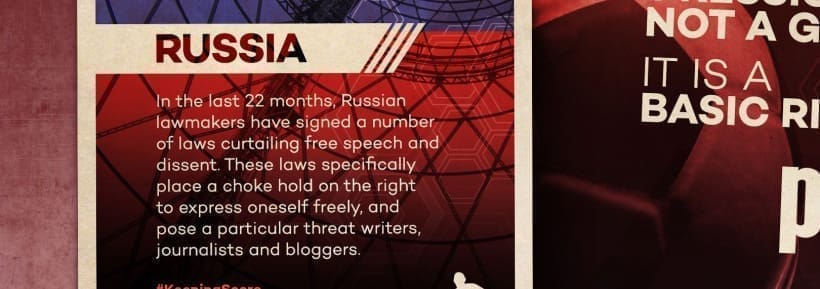“Although our Constitution provides for freedom of speech and freedom of the press, the Russian media does not consider itself free, being very much pressured by authorities, harassed, convicted for practicing their profession. Parliament is introducing new limitations to media freedom and freedom of expression almost on a weekly basis to silence oppositional voices and prosecute independent journalists and civil society activists. That journalists and bloggers can face both criminal and civil defamation cases is having a chilling effect on the media.
“Journalists remained unable to cover the news freely, particularly with regard to contentious topics such as human rights abuses, government corruption, oppositional protests, and some others. According to the 2014 Reporters Without Borders report, Russia remained one of the most dangerous countries in the world for the media. Out of 180 countries assessed, Russia ranks 148 in the field of freedom of speech and media independence.
“Physical violence, harassment and intimidation are not uncommon and in the last 20 years about 360 journalists have been murdered in Russia. The majority of these cases were never brought to court. Journalist safety has a fundamental impact on freedom of expression and bringing perpetrators to justice and demonstrating that intimidation of journalists is not tolerated is vital.
“Criminal defamation law has been used to shield public figures and powerful individuals from criticism that is legitimate and healthy in a democratic society. High awards for damages and disproportionate sentences are at times imposed. In some cases penalties aim at achieving ends other than protecting someone’s reputation, for example to silence public debate on sensitive issues or protect a reputation that does not deserve to be protected.
“Authorities have the means of manipulating public opinion through the state media-empire. In early 2000s various state agencies took financial or managerial control of 80 percent of the regional press and 20 percent of the national press. The three main TV channels are also controlled by the state. Such a number of state-controlled media allows the Russian authorities to effectively formulate media content, even though censorship is prohibited on a constitutional level.
“Control is now being extended to the internet. In May this year a new law was signed which now means popular websites and blogs have to register with the government, a measure that we think will result in more stringent monitoring of online political comment and debate. This new ‘bloggers law’ means that any site with more than 3,000 visitors daily will be considered a media outlet akin to a newspaper and be responsible for the accuracy of the information published.
“Individual bloggers are no longer entitled to maintain their anonymity and organisations that disseminate their writing, such as those providing search engines, social networks and online forums, must now maintain computer records under risk of very high fines. This law will inevitably reduce the number of critical voices and opposition voices on the Internet because bloggers will be more concerned about writing publicly and website hosts are bound by more bureaucracy.
“This policing of bloggers comes only three months after the law that gave the government the power to block websites and online news sites that reported on demonstrations and other political activity. The ability for the press to be able to report freely about protest activities and other public campaign, with no risk for journalists and campaigners, is a state obligation under the European Convention. Sadly the media in Russia is being controlled to such a degree now that it is becoming increasingly hard for the public to access a range of voices, opinion and information.”
Recent Case Studies
Focus on: Press and Net Freedom in Russia
The precarious state of press freedom in Turkey, entwined with a deteriorating democratic environment, poses significant challenges to journalists. Increasingly they face arbitrary arrests, legal threats, and increasing violence in their pursuit of reporting truth. In response to these threats, the Media and Law Studies Association (MLSA), our partner, actively defends press freedom and human […]
Focus on: Press and Net Freedom in Russia
23 October 2023 marks one year since the killing of prominent Pakistani journalist and news anchor for Pakistani broadcaster, ARY News, Arshad Sharif. Sharif was fatally shot at close range by Kenyan Police at a roadblock near Nairobi. To this day, a transparent, independent and effective investigation into the circumstances of his death has not […]
Focus on: Press and Net Freedom in Russia
November 2nd marks the International Day to End Impunity for Crimes Against Journalists. The threats and dangers that constitute a stark reality for many journalists reinforce the importance of this day. Every year journalists are killed, tortured, and harassed for carrying out their work. Over 1,600 journalists have been killed since 2003 with a sharp […]



